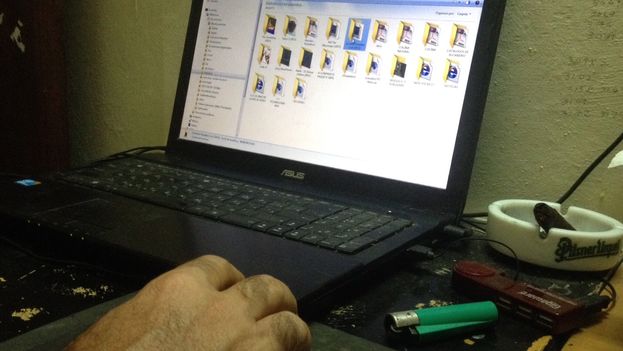
![]() 14ymedio, Luz Escobar, Havana, 23 December 2016 – “Over my dead body!” echoes across a living room in Florida, Camaguey, Cuba, the day Jorge Angel discovered his family absorbed in the weekly packet. Now the wife sneaks to watch the reality shows that come in the weekly audiovisual compendium so as not to annoy the family’s Communist Party militant.
14ymedio, Luz Escobar, Havana, 23 December 2016 – “Over my dead body!” echoes across a living room in Florida, Camaguey, Cuba, the day Jorge Angel discovered his family absorbed in the weekly packet. Now the wife sneaks to watch the reality shows that come in the weekly audiovisual compendium so as not to annoy the family’s Communist Party militant.
Criticized by officialdom, and in ever growing demand among customers, the packet is caught in the crossfire. After several weeks of programming on national television marked by tributes to the recently deceased Fidel Castro, demand for movies, TV shows and documentaries has skyrocketed in the informal market, while institutional hatred against the packet has intensified.
In Central Havana, the most densely populated municipality in Cuba, the impact of the packet is everywhere. Outside La Candeal bakery, two women were talking this Thursday about a Colombian telenovela that arrives in one of the 40 folders included in the popular compilation.
“This is the zone of satellite dishes and the packet,” explains a messenger for Copypack, a place that sells the product put together by an enterprise calling itself Omega. The young man says that over the last three weeks the number of clients has grown, as they “come looking for anything, so long as they don’t have to watch [state] television.”
Distributors have avoided including in the latest compilations material critical of the former president and the popular programs on South Florida channels. “There’s no reason to stick your finger in the eye of the beast,” says the employee.
The caution of the informal producers and distributors has not prevented the authorities from renewing their offensive against the most important competitor to official programming.
This Thursday the newspaper Juventud Rebelde (Rebel Youth) published an article on the subject, signed by journalist Miguel Cruz Suarez under the title The Sweet Poison In The Ostrich’s Hole. The author acknowledges that “thousands of Cubans” prefer audiovisual content that is distributed on flash memories and DVDs, a practice that exposes them to the “disparate scenarios of capitalist entertainment,” he says.
The reporter also points out the dangers of “cultural naiveté” opening the doors to “the guest of banality and consumerist egotism,” although he acknowledges that there are already “some manifestations” of this scourge on the island.
Among the bitterest enemies of the packet is Abel Prieto, Minister of Culture, and Miguel Barnet, President of the National Union of Writers and Artists of Cuba (UNEAC). Both have complained about the poor quality of content consumed, versus that of the state television programming, is content they consider “junk” and “pseudo-cultural products.” Prieto recently warned that the phenomenon could end up expanding in the country “the frivolity of the culturally colonized,” people who “have already given up the pleasure of intelligence.”
However, among ordinary people on the street there are other critics whose voices are also being heard. “The packet has become very cowardly, I don’t watch it,” says Jonathan, who has a degree in History. He explains that “it used to include more interesting and controversial topics, but now it is a little lightweight.”
Wilfredo and Niurka, a couple residing on Monte Avenue in Havana, share this view. “We decided to buy the satellite dish because we want to watch the news and Miami programs that no longer come in the packet,” the wife says. Both believe that the compendium “has become annoying, it’s already as ‘controlled’ at the (state) Cubavision channel.”
